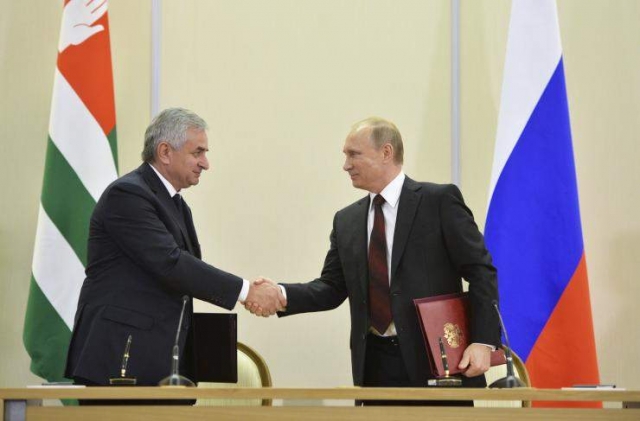He Who Pays the Piper Calls the Tune
The Kremlin is not giving the de-facto government of Abkhazia the 5 billion rubles (90 million USD) it promised six months ago. And according to Vladislav Surkov, Assistant to President Putin, the de-facto government of Sokhumi cannot expect to receive the promised amount unless the pre-conditions are fulfilled. This, despite the fact that almost half the 216 millionUSD budget of the occupied Abkhazia for 2015 was counting on that money. Even cutting the budget won’t help the de-facto government if the government of de-facto president Raul Khajimba does not agree with the pre-conditions that Surkov is demanding.
Last year Abkhazians received a promise of a 5 billion ruble (90 million USD) financial reward - no small amount for Abkhazia - for signing an Alliance Agreement with Russia, with President Putin announcing the amount of the said reward after meeting with Raul Khajimba in the Kremlin. But the agreement itself mentioned nothing of specific dates and in the Russian-Abkhazian patron-client relations, it immediately became clear under what circumstances the Abkhazians would receive this money.
Generally, patron-clientalism in its classical understanding means that the ‘client’ has a voice and can still trade on whether the ‘patron’ will grant it the right to ‘the first night’.
However, the main century-long indicators of Abkhazia’s “strategic loyalty”: (1) Russian as the spoken ‘political language’ of Abkhazian society; (2) a Russian military base; and (3) the Russian ruble – still remain the ground for patron-clientalism, which creates the relevant dependency on Moscow to suffice with symbols such as the Alliance Agreement signed by the de-facto president of Abkhazia last year.
Almost everyone, including the Abkhazians themselves, realized that receiving or not receiving the money would depend on how ‘obedient’ Abkhazians would be while implementing dubious articles in the Agreement (or those leaving room for interpretation). Despite this, the de-facto government of Sokhumi told the general Abkhazian populace that this financial support from Russia would be the main and crucial means for solving social problems and poverty in Abkhazia.
Today, Surkov states that the Alliance Agreement with Russia is not enough to warrant receiving the money. Abkhazians should first agree with the abolition of the so-called local Internal Affairs Ministry and the establishment of a new law-enforcement body on its basis. The last drop of discontent between Russia and Abkhazia was ignoring this project. Vladimer Surkov might be referring to this ‘ignore and non-fulfillment of the pre-condition’ when speaking about Moscow refraining from the money transfer.
Following this statement, and for one week now, Vladimer Surkov has been declared the number one enemy of the Abkhazian people, only second to Georgians. Abkhazian ‘MPs’ make outrageous statements on the violation of Abkhazia’s sovereignty and blackmailing of the Russian Prime Minister’s assistant.
Although criticism of the Kremlin is not so bold in the voices of all the so-called MPs, there is much anti-Russian subtext in the open swearing at Surkov. And nor is the Abkhazian media refraining from heavy criticism of Russian politics. According to Levan Kiknadze, former Security Minister of the Abkhazian Government in Exile, Abkhazians want independence but at the expense of Russian money. They know very well that without financial flows from Russia they cannot exist; they have no economy and nothing of their own; they created nothing and they recognize it themselves.
“Whatever one or two MPs say, it has no effect on any serious decision of the de-facto government of Abkhazia,” Kiknadze said. “Abkhazians want to be independent but at the expense of Russia. They are used to working at the expense of others. Before, they lived at the expense of Georgians, now they want to live at the expense of Moscow. They also have big ambitions in saying why we have no rights and why we live and act according to Russia’s dictations. In short, they want to live independently, but at the expense of Moscow. If not for Russia’s assistance, they would not be able to live. It is obvious and Abkhazians know this very well.”
In fact, Abkhazians have no other ally but the Kremlin. This is why, despite the open statements of discontent, the situation is unlikely to grow into any distinct confrontation with the Kremlin. Nor at this stage can it be expected that an anti-Russian union will be established in Sokhumi to the extent where it will become a dangerous force. Not now and not in the future. Not until Sokhumi finally realizes that he who pays the piper calls the tune.
Zaza Jgharkava












